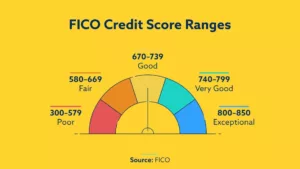
How to add positive credit to your reports
- Lisa Phillips
- March 25, 2024
- How-to Guides
5 Tips to Add Positive Credit
Consumers with bad credit often only concentrate on removing negative information while repairing credit. But there's nothing worse than having only negative credit on your reports.
Credit scoring needs something to calculate when determining a credit score, if there is nothing but negative credit, your credit score will suffer. Here a several ways to add positive credit:
1. Unsecured credit card to add positive credit.
Consumers can add positive credit with on-time payments from unsecured credit cards. Most credit card issuers will pre-qualify you with no impact to credit scores.
Many credit cards now offer monthly free credit scores to cardholders which can help keep you on track with rebuilding credit scores.
If your credit is poor it's probably going to be tough to get approved unless it's a credit card designed for poor credit.
The Destiny Mastercard® can help people with bad credit improve their credit score but the fees are high. Cardholders get all the benefits of a Mastercard, without a security deposit and it reports to all three major credit bureaus.
This type of card should be used temporarily to add positive credit and build credit scores. Once you get to your desired score, don't close it, but apply for a credit card with better terms and rewards.
2. Secured credit card that reports to credit bureaus
Secured cards work much like regular credit cards and are used in the same way. The main difference is the security deposit, making them a good option for those who need to add positive credit reporting accounts.Your deposit is FDIC insured determines your credit line.
While secured credit cards do have a much higher approval rate than traditional unsecured credit cards, there are still situations where someone might not be denied a secured credit card.
Depending on the status of your credit history, a no-credit check secured card could be the best option.
The OpenSky® Secured Visa® Credit Card is really easy to get. Typically, you would need at least $200 for a security deposit which is fully refundable but for a limited time, new customers can get a $50 funding voucher that opens a $200 credit line for $150.
Cardholder earn up to 10% cash back on everyday purchases. Plus, keep track of your FICO credit score for free in OpenSky's mobile app.
3. Unsecured Personal Loan
Timely payments are the biggest factor in credit scores and a personal loan gives you a credit account to consistently make on-time payments on, boosting your payment history. Plus, a personal loan adds to your credit mix.
Credit scoring models like having a mix of credit types (revolving credit like credit cards and installment credit like loans). A personal loan adds to your credit mix, showing you can manage different kinds of debt.
If your credit scores are currently on the shaky side, if might be more difficult to get approved for a personal loan, unless it's a loan for bad credit.
The Upgrade personal loan only requires a 560 minimum credit score.
Loan amounts start at $1,000 and range up to $50,000 with repayment terms between 3 to 7 years.
4. Secured Personal Loan
A secured personal loan works much like a secured credit card where a deposit serves as collateral for the loan. In the case of a bank secured personal loan you may be able to use a savings account or certificate of deposit account to secure a personal loan.
In fact, there is an easy to qualify for cd secured loan. Self Lender allows people who need to build credit an opportunity to open a certificate of deposit for as little as $25 per month. Self Lender helps you get a small loan that you save in a CD for 12 or 24 months (FDIC- insured certificate of deposit bank account).
The payments toward the CD is reported to all 3 major credit bureaus and at the end of account term you've built credit history and your CD savings unlocks. No hard credit pull and no credit history required.
5. Store Credit Accounts
Store credit accounts are typically easier to qualify for than a major credit card, but they are notorious for higher interest rates. The good news is you don't have to keep this type of card forever, once your credit history improves, apply for credit cards for good credit.
Here's the best approach to utilizing a store credit account to add positive information to your credit reports:
- Only charge small amounts that you can easily pay off in full every month. Think of the card as a tool for building credit history, not for making large purchases.
- Pay off your balance as soon as possible, even multiple times within the billing cycle if necessary. This prevents the high interest from even having time to accrue.
Use store cards like Kohl's that offers discounts and customer rewards to get the best deals.
Save 35% on Kohl’s only brands and other brands when you open a Kohl’s Card.
Maintain low utilization
After you add positive credit to your credit reports you must not max out or charge close to the credit limit.
Consumers who routinely max out credit cards are more likely to experience problems repaying the debt should a change of circumstance occur, such as loss of income or illness.
The lower the utilization rate, the better your credit score. In fact, the best credit scores have a credit utilization of 10% or less according to myFico, the most widely used credit scoring system.
When attempting to improve credit scores, the best practice is to avoid charging more than 10% of your available credit limit unless you pay in full each month.
New credit should be reported to credit bureaus
All new credit accounts should be reported to the credit bureaus. This is how you will improve your credit scores. In the event you only qualify for a secured credit card make sure it reports to the credit bureaus. The ideal scenario is to have the credit card company report the account the same way an unsecured credit card is reported.
More Credit Boost Resources
- Check out how to legally change your credit scores.
- Learn this little known credit hack to improve credit scores.
- Discover a no-credit check secured visa that upgrades to an unsecured.
- Find out why authorized user tradelines might be a good option for people with really bad credit.
- Get a quick boost in credit scores just by paying your cell phone, streaming service, rent and utilities.
Content
Who We Are
Get In Touch
6080 Center Dr, 6th Fl
Los Angeles, CA 90045











